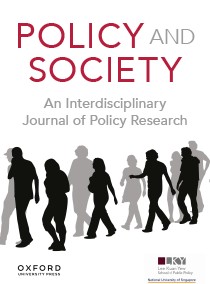Governance of Generative AI
IF 6.1
1区 社会学
Q1 POLITICAL SCIENCE
引用次数: 0
Abstract
The rapid and widespread diffusion of generative artificial intelligence (AI) has unlocked new capabilities and changed how content and services are created, shared, and consumed. This special issue builds on the 2021 Policy and Society special issue on the governance of AI by focusing on the legal, organizational, political, regulatory, and social challenges of governing generative AI. This introductory article lays the foundation for understanding generative AI and underscores its key risks, including hallucination, jailbreaking, data training and validation issues, sensitive information leakage, opacity, control challenges, and design and implementation risks. It then examines the governance challenges of generative AI, such as data governance, intellectual property concerns, bias amplification, privacy violations, misinformation, fraud, societal impacts, power imbalances, limited public engagement, public sector challenges, and the need for international cooperation. The article then highlights a comprehensive framework to govern generative AI, emphasizing the need for adaptive, participatory, and proactive approaches. The articles in this special issue stress the urgency of developing innovative and inclusive approaches to ensure that generative AI development is aligned with societal values. They explore the need for adaptation of data governance and intellectual property laws, propose a complexity-based approach for responsible governance, analyze how the dominance of Big Tech is exacerbated by generative AI developments and how this affects policy processes, highlight the shortcomings of technocratic governance and the need for broader stakeholder participation, propose new regulatory frameworks informed by AI safety research and learning from other industries, and highlight the societal impacts of generative AI.生成式人工智能的治理
生成式人工智能(AI)的快速和广泛传播释放了新的能力,并改变了内容和服务的创建、共享和消费方式。本期特刊以《2021年政策与社会》关于人工智能治理的特刊为基础,重点关注治理生成式人工智能的法律、组织、政治、监管和社会挑战。这篇介绍性文章为理解生成式人工智能奠定了基础,并强调了其主要风险,包括幻觉、越狱、数据训练和验证问题、敏感信息泄露、不透明、控制挑战以及设计和实现风险。然后研究了生成式人工智能的治理挑战,如数据治理、知识产权问题、偏见放大、隐私侵犯、错误信息、欺诈、社会影响、权力失衡、有限的公众参与、公共部门挑战以及国际合作的需求。然后,文章强调了一个管理生成式人工智能的综合框架,强调了对适应性、参与性和前瞻性方法的需求。本期特刊的文章强调了制定创新和包容性方法的紧迫性,以确保生成式人工智能的发展与社会价值观保持一致。他们探讨了调整数据治理和知识产权法的必要性,提出了一种基于复杂性的负责任治理方法,分析了大型科技公司的主导地位如何因人工智能的衍生性发展而加剧,以及这如何影响政策流程,强调了技术官僚治理的缺点和更广泛的利益相关者参与的必要性,提出了基于人工智能安全研究和从其他行业学习的新监管框架。并强调生成式人工智能的社会影响。
本文章由计算机程序翻译,如有差异,请以英文原文为准。
求助全文
约1分钟内获得全文
求助全文
来源期刊

Policy and Society
Multiple-
CiteScore
18.00
自引率
6.50%
发文量
43
审稿时长
30 weeks
期刊介绍:
Policy and Society is a prominent international open-access journal publishing peer-reviewed research on critical issues in policy theory and practice across local, national, and international levels. The journal seeks to comprehend the origin, functioning, and implications of policies within broader political, social, and economic contexts. It publishes themed issues regularly and, starting in 2023, will also feature non-themed individual submissions.
 求助内容:
求助内容: 应助结果提醒方式:
应助结果提醒方式:


